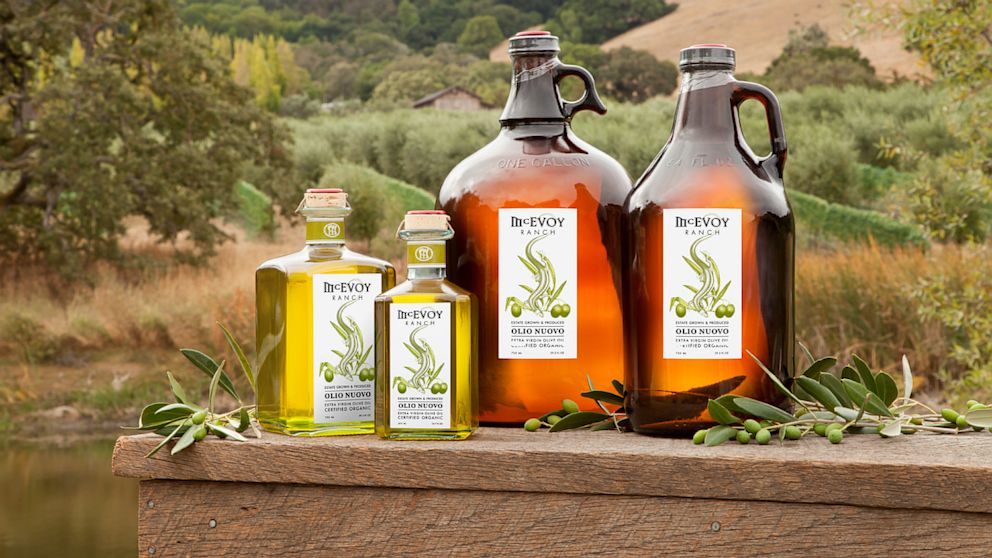US producers of the real thing, such as McEvoy Ranch in Petaluma, Calif., want purity and quality standards that would help consumers tell real from fake.
Something labeled "virgin" you'd expect to be authentic beyond reproach—"extra-virgin" even more so. But in the case of olive oil, say experts, it's quite a slippery slope. The evidence on olive oil has been piling up for several years. A 2011 study of extra virgin olive oil (EVOO) by the Olive Center at the University of California at Davis found that 73 percent of the five best-selling imported brands failed to meet the standards of taste and smell established for that grade of olive oil set by European regulators.
In a 2012 taste test, Consumer Reports found that only 9 out of 23 extra virgin olive oils tested met the tasting panel's standards. The two it rated "excellent" both came from the U.S.
Now comes the U.S. International Trade Commission, which, in a just-released report—"Olive Oil: Conditions of Competition Between U.S. and Major Foreign Suppler Industries"—finds evidence of rampant fraud. A lack of uniform and enforceable quality standards, says the report, has allowed "a wide range of oil qualities to be marketed as extra virgin," including ones "adulterated and mislabeled."
Virgin olive oil, according to a staffer who worked on the report, is generally defined as being oil from olives not treated with chemicals, obtained from only the first pressing of the fruit (not by subsequent pressings of the left-over residue). Extra virgin, he explains, is the highest grade of virgin, defined as coming from olives milled within 24 hours of harvest. It can range in color from yellow to green, must be free from defects and free from fatty acids. The oil must be obtained by physically milling or pressing the fruit--not by heating it. Additives are not permitted.
The same analyst explains that adulteration can take many forms: extra virgin olive oil can be cut with other seed oils, including soybean. Extra virgin can be blended with olive oils of lesser grades, on down to those "not fit for human consumption." Such grades of oil can be rendered fit for consumption by heating , which deodorizes and removes impurities. The resulting oil is relatively flavorless and on a par with vegetable oil.
Such adulterated products, according to the USITC, are widely being sold as pure, authentic extra virgin oil.
In a 2012 taste test, Consumer Reports found that only 9 out of 23 extra virgin olive oils tested met the tasting panel's standards. The two it rated "excellent" both came from the U.S.
Now comes the U.S. International Trade Commission, which, in a just-released report—"Olive Oil: Conditions of Competition Between U.S. and Major Foreign Suppler Industries"—finds evidence of rampant fraud. A lack of uniform and enforceable quality standards, says the report, has allowed "a wide range of oil qualities to be marketed as extra virgin," including ones "adulterated and mislabeled."
Virgin olive oil, according to a staffer who worked on the report, is generally defined as being oil from olives not treated with chemicals, obtained from only the first pressing of the fruit (not by subsequent pressings of the left-over residue). Extra virgin, he explains, is the highest grade of virgin, defined as coming from olives milled within 24 hours of harvest. It can range in color from yellow to green, must be free from defects and free from fatty acids. The oil must be obtained by physically milling or pressing the fruit--not by heating it. Additives are not permitted.
The same analyst explains that adulteration can take many forms: extra virgin olive oil can be cut with other seed oils, including soybean. Extra virgin can be blended with olive oils of lesser grades, on down to those "not fit for human consumption." Such grades of oil can be rendered fit for consumption by heating , which deodorizes and removes impurities. The resulting oil is relatively flavorless and on a par with vegetable oil.
Such adulterated products, according to the USITC, are widely being sold as pure, authentic extra virgin oil.

